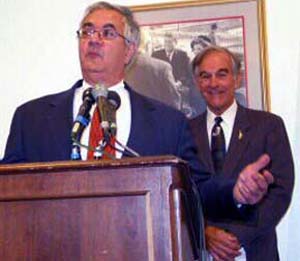 |
International Affairs
From Self-Deception to Self-Destruction
Toby Westerman
As America looks to cut government spending in an increasingly troubled economy, the defense of the United States is on the chopping bloc. Behind the economic concerns, however, is a dangerous complacency based upon a self-deception concerning the world around us.

Barney Frank & Ron Paul ask for substantial cuts in self-defense weapons
|
A bi-partisan group of U.S. House members, including Representatives Barney Frank and Ron Paul, is circulating among the Washington elite a letter urging drastic cuts in money spent to protect America. This letter follows on the heels of a New York Times editorial which, among other things, decries money spent on “new versions of cold war weapons systems ill suited to America's 21st-century military needs: aircraft carriers, nuclear attack submarines, stealth destroyers and manned aerial combat fighters.”
The push to cut major defense programs comes when the espionage committed against the United States by Russia, China, and Cuba is at Cold War levels, when our ally Taiwan faces a the threat of invasion from the Communist China, when billions of dollars are being spent by Russia and China in a headlong rush to modernize their respective military machines, and when both Beijing and Moscow are supporting every nation in the world that is hostile to the United States.
The fantasy
In large part, the disconnection between reality and the call for deep cuts in the U.S. military stems from the fantasy of the “Fall of Communism.” The 1991 collapse of the Soviet Union is commonly considered the “Fall of Communism,” although China, Cuba, Vietnam, North Korea, and Laos remained under Communist regimes.
At the time we saw the end of the Soviet Union, the assumption was that, due to a yearning for freedom and a desire for the benefits of the capitalistic system, the remaining Communist States would soon disappear. Based on this fantasy, millions of dollars in financial aid and investment flowed from the West into the “new” Russia and the surviving Communist States with the hope that they would advance the ideals of Capitalism and human freedom.
The results have been dismal. Since the end of the Soviet Union, no other Communist government has fallen. The Communist Party remains firmly in power in China, as is the case with the other surviving Marxist regimes. Not only have Communist regimes survived, but their number has actually increased with the rise to power of the now ailing Hugo Chavez in Venezuela and his allies in Bolivia, Ecuador, Nicaragua and most recently in Peru.
Even in the United States, the far left has found new energy as evidenced in the “Occupy” demonstrations/riots against Capitalism staged throughout the nation. The “Fall of Communism” has, ironically, given Marxism a new lease on life, and presented stunningly new dangers to the United States and its allies.
We would be better prepared to meet the dangers ahead if we realized that the “Fall of Communism” has occurred more than once.
The first fall of Communism
The Russian Revolution and its civil war that followed left Soviet Russia in ruins. The Bolsheviks, victorious against their Tsarist opponents, soon found that none of their pre-revolutionary ideas were working. The Revolution faced defeat not from armed opponents, but from internal economic collapse.
Lenin, the founder of the Bolshevik Revolution, came to the conclusion that drastic steps were needed and that overt Communist hostility to the West must cease - until a more opportune time appeared. After years of revolutionary activity against the capitalist world, Lenin and his Bolsheviks needed an ally to convince the world that “a real change” was at hand in Soviet Russia.

Duranty played the 5th column favoring Communism |
Lenin found a media ally in The New York Times and its correspondent on Russian affairs, Walter Duranty. Because of his service to the Bolsheviks, he was allowed into Russia and became the Moscow correspondent for The Times, the recognized dean of Moscow correspondents and the acknowledged authority on all things Soviet.
Duranty and The New York Times tailored the reporting from Moscow to suit Bolshevik wishes. “Lenin has thrown communism overboard,” wrote Duranty in a front page article appearing August 13, 1921. On October 7, 1921, another page one Duranty article proclaimed in its headline that “Russia Gets Back to Individualism,” and affirmed that “the new economic policy [of Lenin] bids fair to bring about a change in Russia almost as complete as the Bolshevist revolution itself.”
Lenin's propaganda effort was now underway. The change was called the New Economic Policy (NEP). During the period of the NEP, other pro-Soviet activists, including Armand Hammer who later controlled Occidental Petroleum, worked to supply needed investment funds to the Soviet State. Moscow took advantage of the West's belief that Communism was, as one headline put it, “losing its grip.”
During this period, Soviet agents worked successfully to infiltrate and destroy the anti-Bolshevik movements of exiled Russian patriots. The Soviets initiated an extensive propaganda effort inside Europe and America, and Soviet spies began their espionage efforts against the U.S. and other Western governments.
Not all of the Bolsheviks approved of the NEP, and Lenin's successor, Joseph Stalin, ended Lenin's “New Economic Policy” in 1928. Many in the Soviet leadership believed that the end of the NEP occurred too quickly, but disagreeing with Stalin was a fatal matter. Stalin's termination of the NEP and the lives of many of those connected with it haunted the surviving Soviet oligarchy even after Stalin's death in 1953.
The second fall of Communism
The end of Stalin's murderous rule allowed the Soviets to reconsider Communism's potentially disastrous position vis a vis the West. It soon became apparent that a different economic policy must somehow be instituted.

The "new" Russia or China never stopped supporting radical Communism

|
Glasnost, perestroika and the second “fall of Communism,” however, got out of hand, and the Soviet Union did, indeed, collapse. Fidel Castro, founder of the Russian Revolution, called the collapse of the Soviet Union naïveté and inadvertency. Vladimir Putin, the sometimes Prime Minister - sometimes President of the “new” Russia and former Soviet spy master, branded the Soviet Union's demise as “the greatest geo-political catastrophe of the 20th century.” Despite the assessment of Castro and the lament of Putin, the West rushed to get in on the ground floor of a spectacular opportunity to invest in the “new” and “democratic” Russia.
The same attitude prompted investment in Communist China. The belief was that the Chinese Communist oligarchy could not withstand the same historical forces that had swept aside the mighty Soviet Union.
We must be vigilant
The result of the second “Fall of Communism”, thanks to Western assistance, has provided the Moscow oligarchy with advanced technology that its spies could never have accumulated, and provided the money to build a modern military force. The same has been true of Communist China, which, in addition, now holds a mountain of U.S. debt.
Cuba, still partially isolated by the U.S., so far has been able to cash in on investment in Communism almost primarily as a purveyor of stolen military secrets and a resource for Venezuelan Marxism.
In view of the immediate threats facing us, bi-partisan calls for the abandonment of major defense projects and systems is simply a call for disarmament and U.S. destruction. Now is not the time for blindness to the threats around us. Now is not the time to disarm. America must reexamine its preconceptions of such episodes - from Richard Nixon's “opening of China” in 1972 to the second “Fall of Communism” in 1991.
If we are truthful with ourselves, we will conclude that there are aspects of the 21st century that look alarmingly like the most dangerous years of the 20th, and that Communism does not appear to have “fallen” after all.

Posted November 4, 2011
Toby Westerman publishes
International News Analysis - Today
An investigative, analytical, and uncompromising weekly analysis of the world situation
Contact T. Westerman at
www.inatoday.com
or P.O. BOX 5182, Rockford, ILL, 61125-0182

Related Topics of Interest
 Our Duty to Support Taiwan Our Duty to Support Taiwan
 Cold War II: What Happened to the Fall of Communism? Cold War II: What Happened to the Fall of Communism?
 Weakness at Home – Attack from Abroad? Weakness at Home – Attack from Abroad?
 Color Variations in Communism - I Color Variations in Communism - I
 Color Variations in Communism - II Color Variations in Communism - II
 A Socialist West? When? A Socialist West? When?
 The New Kremlin Bridgehead in Latin America The New Kremlin Bridgehead in Latin America


|
International Affairs | Hot Topics
| Home | Books | CDs | Search | Contact Us | Donate

© 2002- Tradition in Action, Inc. All Rights
Reserved
|
 |
|